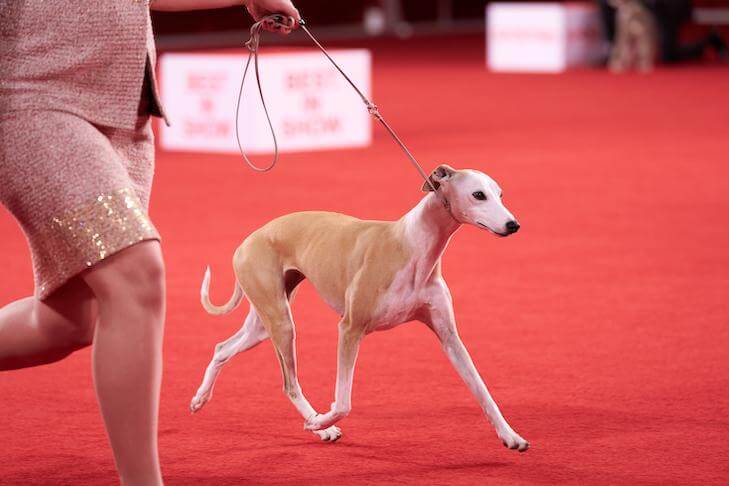Find A Great Handler
A few years ago the Portuguese Water Dog National Specialty was held in San Luis Obispo, California in October and Aviator Kennel had eight class dogs and nine specials for Best of Breed entered in the week-long competition in multiple classes and specials. On the Sunday prior to the beginning of the National on Monday, our professional handler, Amy Rutherford, competed with Ladybug in Burbank, California winning a Best in Show from Judge Houston Clark. Amy and her crew then immediately drove from Burbank to San Luis Obispo, a three hour drive.
We had arrived early at the show to help coordinate our herd of dogs and their co-owners who drove in to help with the show. Once in SLO, Amy set up her grooming area with her assistants Camille Bakker and Megan Hoff and went to work bathing, grooming and training their charges for the week’s events. We did very well during the week, winning class and veteran classes shown by Amy, Camille and Megan.
On Wednesday, just after the class dogs were finished, Amy used our Mazda CX7, packed with her Scotty Terrier to drop off at San Francisco Airport, a six hour drive, to pass off to a fellow handler, Bill McFadden, on his way to the big Terrier show in Montgomery County, Pennsylvania. Amy got back to the SLO show ground by about 3:00 a.m., ready to show dogs that morning.
By Friday, we were ready for the Best of Breed competition for the National Specialty. At a tent we set up near the show ring, Amy and her crew organized and managed a dozen volunteer owners, including us, to hold dogs, keep them out of the weather and do a little final brushing. We were delighted of course when Ladybug won the National Specialty and Aviator’s Asta Primdona “Asta” won an Award of Merit. But…there was no celebration, nor the opportunity to enjoy a nice chardonnay with the whole crew.
Delayed only by the required photo with Judge Karen Arends, Amy and Megan left within an hour to drive to the San Francisco Airport, still a six hour drive, including Ladybug, crates and gear and several Terriers all packed into their van. Amy had to be at Montgomery on the east coast—now!
After dropping off Amy, Megan Hof drove three hours to their kennel in north Sacramento to prepare for the Roseville, California dog show that started on Saturday morning. That day, Megan handled Ladybug and won another Best in Show from Judge Col. Joe Purkheiser. Back in San Luis Obispo several of our dog owners helped us assist Camille in packing up all of the tents, grooming tables, equipment, tools and gear into our van and our Mazda CX7. The night before one of Amy’s generators was stolen from the site to add to the chaos. Camille left immediately on Friday back to Sacramento and we picked up our car at their kennel on Saturday. Just another dog show and 1,000 new miles on our Mazda.
People Do This for a Living?
While the logistics for the National Specialty may seem unusual; it’s not. This is the life of professional handlers and owners of competitive dogs. You can have a great dog and be a great owner but without a great handler it’s unlikely you’ll ever have the kind of success that we enjoyed with Ladybug. Amy Rutherford has handled dogs for us for ten years, finishing many champions and placing several PWDs in the top ten. To accomplish that level of success, we’ve watched Amy and her assistants work incredible hours, get little sleep or decent food and work in really terrible conditions. Whether it’s showing a dog in the rain and mud at an Oregon show or grooming with electrical equipment in two inches of water at Eukanuba, the word “glamour” does not apply.
What Are the Traits of a Great Handler or What is a “gas dog” Anyway?
Once you’ve made the decision to hire a professional handler, you need to look for very specific traits exhibited by the top handlers. First and foremost, is your handler honest and forthright with you and other handlers? Is she brutally honest about the quality of your dogs and their chances to win? We have seen more than one dog dragged around in competition by a professional handler who has no real chance to win a Best of Breed much less multiple groups or Best in Shows.
We’ve even talked to owners of these poor beasts and listened to them talk about absolute nonsense their handler has dumped on them about why their dog should continue to show. We’ve never shown our dogs to lose or be mediocre. We don’t always win, nobody does, but we’re always committed to only present dogs when they have a legitimate chance to win and take advice from our handler to heart. So, what is a gas dog anyway? A gas dog is a dog whose primary purpose is to provide additional income to help defray expenses for the handler even though the dog is unlikely to be really successful. Good handlers don’t do that; they want to win as much as the owners; or at least, they should.
Great Handlers and Dog Breeders Have Great Reputations
Great handlers also have great reputations with the fancy, judges and other handlers. We know that there have been times when one of our dogs won because we have had Amy Rutherford, Bill and Taffe McFadden primarily as our handlers over the years. It wasn’t because our dog was inferior and a judge favored the handler anyway. In any judging competition there are times where a judge will have two or three dogs of virtually equal quality or standards; how can they make a final differentiation? It’s not unethical or wrong for a judge to look at how the dogs are handled; who gets the absolute most out of a show dog in the ring?
It’s also human nature for judges to get used to the fact that some handlers always show up with outstanding dogs; they aren’t showing gas dogs. That’s why the great handlers are honest with their client/owners/breeders about the quality of a dog brought to them. They self-select out dogs that they know just aren’t going to do very well. Judges figure out who bred particular dogs over time; great breeders develop a “type” and “style” if they know what they are doing.
We have a young PWD named “Jedi” who lives in South Korea and competes all over Asia. He won multiple shows in the Philippines recently. His owner and handler told us that on the first day of six days of competition, several judges asked him if Jedi was an Aviator dog; they suspected as much based on the way Jedi looked and moved. We are pleased to be an overnight success after more than 30 years!
Great Handlers Are Great Colleagues
Over the years we found that most handlers helped each other freely and quickly. When a handler needed someone to step in and show a dog because of ring time conflicts or other problems, good handlers helped out without hesitation. It took us a while to realize that in most cases this was done without pay, it was simply professional courtesy. For Mike, a lawyer, it was a pleasant surprise to discover professional courtesy still existed. In his profession, that disappeared a long time ago.
When Amy delivered a Terrier to Bill McFadden it was simply one of many time that they had helped each other out; no big deal. At Westminster, Dogs in Review holds a competition for that year’s best professional handler. When you look at the lineup for the award each year you see the great handler All-Star team; all of whom exhibiting the best traits of their profession.
We also have noticed that great handlers never disparage other handlers or try to take work away from a competitor. Because of our success, we’ve been approached many times by handlers trying to get our dogs to show and take work away from our handlers. We wonder if they even figured out that that approach disqualified them out of hand.
We learned a long time ago that good sportsmanship is critical for us and for our handler. Nobody always wins and we’ve learned to be gracious when we win and good sports when we lose. We make it point to congratulate our competitors when they beat us as. We’re still surprised when a handler or fellow owner or breeder stomps off when we’ve won. It doesn’t cost much to try to be nice and classy although the cost seems to be too high for some people. We’re talking dogs here, right? Not world peace.
Nobody always wins and we’ve learned to be gracious when we win and good sports when we lose.
Does the Handler Have the “touch”?
Early on in our show dog insanity we noticed that there are stark differences in professional handlers. You can’t spend much time watching a competition without discerning that different handlers have a very different “touch” with their dogs. The great ones obviously have a connection with their dogs and the dogs respond to that connection. When you watch a handler yank their dogs around and sometimes even hit them you don’t have to guess that that handler is not in the top tier of success.
Ladybug was so successful primarily because of the emotional link between her and her handlers; they really love each other and it shows in the ring. A great handler lets the dogs be the star, not them. I watched one handler at Westminster dance, swoop and pirouette in the ring, her hands casting lovely circles in the air. We, and her dog I suspect, were wondering where the hell she though she was? I have no idea if her dog was any good or not because we all were so distracted by the theatrics of the handler. Great handlers speak through their dogs; they let them be the stars.
Do I Really Need to Hire a Professional Handler?
There’s no quick answer as to whether you need to hire a professional handler. After all, you can save money and do well handling your own dogs, right? Well, there is one quick answer. The only good reason to hire a professional handler is if you want to win at dog shows.
We’re not saying that someone can’t win with their own dogs at shows; it happens every weekend at some show in the country. In class and even Best of Breed competitions we see people win who are not professional handlers. On rare occasions they might even pull off a Group or Best in Show win; but not very often. Is this just our opinion?
As it so happens, MB-F Shows published a study they conducted for shows held in 2008 and 2009. It was titled, “Judges Only Put Up Handlers, So Handlers Must Be The Only Ones Winning At Dog Shows”. They looked at over 160,000 winners awards and found that 86% of the winners were awarded to dogs with no agent listed. So, you don’t need to have a handler to win, after all. Not so fast; remember what they say about statistics, “Lies, damn lies ands statistics.”
When you drill down into the MB-F results you discover that as you move up through the food chain from class wins to Best in Show the results change dramatically. For Best of Breed wins 34% were won by someone listed as a handler and 66% were won with no agent listed. For Group wins, 55% were awarded to handlers and for Best in Show 66% were awarded to dogs with a handler. The tougher the competition, the more important it is to have a handler if you want to win consistently and at the highest level.
But, I Can Save Money Showing My Own Dog
Alright, maybe the average owner/breeder can’t win as often as they might with a handler, but you can still save money, right? For the average dog in the ring the amount of time it takes to win a championship depends greatly on how well that dog is presented. We know from experience that a puppy we have evaluated as a potential champion will get finished in 10-15 shows over three to four months.
First, we never put a dog into competition until Cathy and the handler believe that the dog is ready to win; not just compete.
Second, once in the ring if we see that the young dog really isn’t ready, we’ll pull the dog out for a while to mature. Particularly for male Portuguese Water Dogs it’s not unusual for a dog to be nearly three before their brains and coordination has merged enough for them to win.
Third, we don’t like to compete against ourselves. We typically have a lot of dogs ready for competition and it doesn’t make sense to win a class while another one of our dogs loses the same class. Our owners wouldn’t be too crazy about that either. We have watched many owner/breeders trudge around the ring with a hapless pup for over a year knowing that a handler would have finished the dog in a few shows. So, which costs more in money and emotional rejection, handle the dog yourself or have a handler show your dog?
Finding a great handler and developing the long term partnership necessary to having show success is an art, not a science. Anyone can do it if they take the time and planning that the sport demands. Larry Bird was a legendary NBA three-point shooter. The fact that he took about 1,000 practice shots a day probably helped.
From the September 2018 Issue of Showsight. Click to subscribe.








